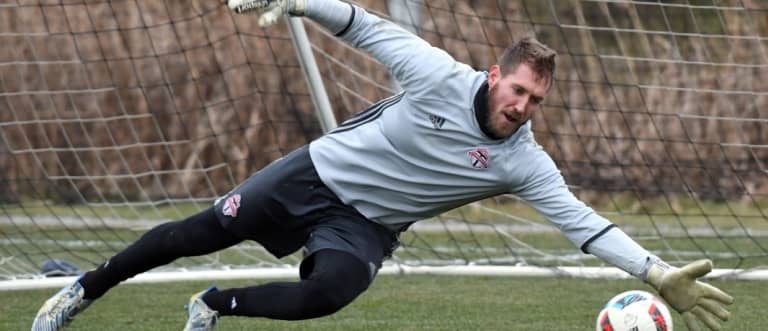TORONTO – Clint Irwin will arrive at Saturday’s MLS Cup final (8 pm ET, FOX, UniMás in US | TSN1/3/4, RDS in Canada) with one of the most epic, journeyman-turned-champion stories in recent MLS history.
When Toronto FC’s quick-witted, cult-favorite goalkeeper takes the field to mind the net at BMO Field, he’ll do so in front of 36,000 screaming fans – literally tens of thousands of times as many as he’s played for in some games of his post-college career.
Just five years ago, Irwin was grinding it out in Canada under far different circumstances – as part of Capital City, a club in the unsanctioned, semi-pro Canadian Soccer League. And yet, as he faces the possibility of his first MLS Cup trophy for both himself and his club, he’s quick to point out that this moment is not, in fact, something he always dreamed of.
“Not at all. When I was playing in the lower leagues, MLS was like a world away,” he said after Toronto FC training on Thursday afternoon. “You watched it on TV, and maybe knew a couple guys who were playing, but [after Capital City] I was back-up [goalkeeper] on a USL team. The steps of the ladder were a lot higher from where I was at.”
In fact, he may not be thinking about much, specifically, at all in the moment he hits the field. Considered by close MLS-watchers to be one of the most cerebral guys in the game, Irwin will instead be focusing on a state of flow, and hopefully not much else. Credit meditation sessions with TFC’s director of high performance, Michael Rabasca.
“This part of the season is crazy and you have a lot of things going on,” Irwin explained. “[Meditating] helps you block out everything. As athletes, we’re always trying to find that flow where it feels effortless. It helps you zero in on one thing at a time, and that translates to the field.”
Perhaps, then, this all makes Irwin one of the guys most deserving of lifting the trophy on Saturday. He won’t be focusing on his years in the lower divisions (after Capital City in 2011, he put in a USL stint at the Charlotte Eagles in 2012). He also won’t be focusing on his previous two years in MLS, at the Colorado Rapids from 2013 to 2015. And he won’t be focusing on any personal glory-hunting.

Instead, he’ll just focus on doing his job, and keeping his mind in a state that’s primed for success. If anyone is good at shutting out external noise, it’s Irwin.
“My first year, people said, ‘We don’t think you have as much of a presence, or enough experience.’ That’s something that’s hard to work on – experience – but I went out and got experience, even at a lower level,” he said. “And then a lot of it was just that you have to fake it till you make it sometimes. You have to go outside of yourself sometimes to be what they’re looking for, even if it’s maybe not your personality.”
By now, the move to Toronto has proved to be the real thing for Irwin – no faking here. At this Canadian side, he’s excelled, particularly at keeping clean sheets, and his maturing personality has gelled with his teammates' particularly well.
“You have to figure out what the players around you respond to, what buttons to push for yourself to make yourself feel more attached to the team, or to get them to respond,” he said. “For me, I just have to be consistent. We have guys on this team who are very good players and can score goals, so it’s just a matter of making good decisions back there, and blocking the shots you’re supposed to, and really just managing the game.”
He’ll have a lot to manage, indeed, on Saturday, when Nicolas Lodeiro, Jordan Morris and the rest of Seattle’s attacking onslaught hit BMO. But as much as he’ll drop into the flow during the match itself, in the opening moments, Irwin won’t be missing any of its significance in personal terms.
“It pretty much happens at every game at this point – I get the tingling feeling,” he said. “You kind of have these flashbacks to where you were playing, some of these small fields around Toronto with 20, 30 people watching, literally, on a high-school field with a track around it. The scoreboard might be on, the scoreboard might not be on. That was where you were at, and then to come here, and be in front of 40,000-plus people – more than 60,000 people in Montreal [in the first leg of the Eastern Conference Championship] — it keeps you grounded.”












